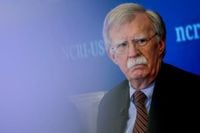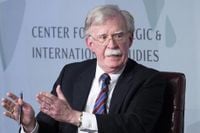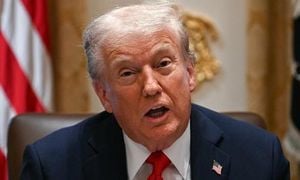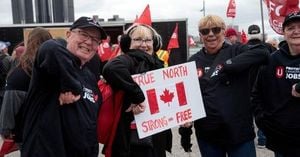The political and legal worlds in Washington are bracing for another seismic development as John Bolton, the famously hawkish former National Security Advisor to President Donald Trump, faces a potential federal indictment that could land as soon as next week. According to reporting from MSNBC and corroborated by multiple outlets, the U.S. Attorney’s Office in Maryland is moving swiftly toward criminal charges against Bolton, marking yet another high-profile case in a string of indictments involving prominent critics of Trump’s administration.
For Bolton, the controversy centers on allegations that he improperly retained and possibly shared classified documents while serving in the White House and during his earlier tenure as U.S. Ambassador to the United Nations under President George W. Bush. The FBI, acting on a court-approved warrant, raided both Bolton’s Maryland residence and his Washington, D.C. office in August 2025. Sources familiar with the investigation told NBC News and The Economic Times that the searches were part of a national security probe, specifically targeting classified records that may have been stored or transmitted without authorization.
The legal stakes are high. The search warrants reportedly referenced potential violations of the Espionage Act, one of the most severe statutes governing the handling of state secrets in the United States. A heavily redacted affidavit, recently unsealed, revealed that FBI agents seized phones, computer equipment, and a trove of sensitive files from Bolton’s possession. The affidavit also alludes to a foreign hack of Bolton’s AOL account, hinting at possible international intrigue layered atop the domestic legal drama, as reported by AP News.
Bolton’s legal team, led by Abbe Lowell, has consistently maintained his innocence. Lowell argues that the documents in question date back to Bolton’s earlier periods of public service and are typical of what longtime government officials retain for archival purposes. “He did nothing illegal,” Lowell insisted, according to The Economic Times. Bolton himself has pointed to a 2020 letter from the National Security Council confirming that his controversial memoir, The Room Where It Happened, contained no classified material, despite Trump’s public accusations to the contrary.
The Justice Department, for its part, has remained tight-lipped. “As a matter of law, we will not discuss any grand jury matters with the media, but this Justice Department is united as one team in our mission to make America safe again,” a spokesperson told The Economic Times. “And the Attorney General, Deputy Attorney General, along with the entire team at Main Justice continue to empower our U.S. Attorneys to pursue justice in every case.”
The origins of the investigation are themselves a study in inter-agency cooperation and tension. According to sources cited by MSNBC and The Economic Times, the CIA, under Director John Ratcliffe, provided intelligence that led FBI Director Kash Patel to seek the search warrants. The involvement of the CIA signals the seriousness with which the intelligence community viewed the potential mishandling of sensitive material.
But the legal action against Bolton cannot be understood in a vacuum. It comes amid a rapidly escalating series of federal charges against other prominent Trump critics. Former FBI Director James Comey was indicted in late September 2025 on two counts of making false statements and obstruction of justice. Just days later, New York Attorney General Letitia James, a frequent Trump adversary, was indicted on charges of bank fraud and making false statements to a financial institution. Both indicted officials have denied wrongdoing—Comey pleading not guilty, and James characterizing her indictment as “political retribution” orchestrated by Trump.
Trump’s own role in this unfolding saga is hard to ignore. In a September 20, 2025, post on his social media platform, Truth Social, Trump urged Attorney General Pam Bondi to take action against Comey, James, and other political opponents. “They’re all guilty as hell, but nothing is going to be done,” he wrote. “We can’t delay any longer.” Legal experts have suggested that such public statements could be cited as evidence of political interference and malicious prosecution, a point not lost on the accused or their defenders.
Bolton’s relationship with Trump has been famously acrimonious since his departure from the White House in 2019 following a high-profile dispute over foreign policy. Bolton’s 2020 memoir painted an unflattering portrait of Trump’s leadership, prompting the former president to call for Bolton’s prosecution and accuse him of leaking classified information. “He released massive amounts of classified, and confidential, but classified information. That’s illegal and you go to jail for that,” Trump told Fox News in a 2020 interview, as reported by The Economic Times.
Bolton, however, has steadfastly denied any wrongdoing, maintaining that he followed all required procedures and obtained appropriate clearances before publishing his book. He has also remained a vocal critic of Trump, particularly on issues of foreign policy and national security, which has only deepened the rift between the two men. Trump, for his part, has repeatedly insulted Bolton in public, labeling him a “lowlife,” “dumb,” and even revoking his Secret Service detail in 2025 despite credible threats against Bolton’s life from Iranian operatives.
The broader political context is fraught. Retired FBI special agent Jody Weis, speaking with The National News Desk, commented on the apparent double standard in the application of justice: “All we heard after that search -- or raid if you want to use the term -- was ‘no one is above the law. Let the process play out.’ Yet, those very same people today are saying how chilling this search of John Bolton’s residence was, that it’s a threat to democracy. That it’s revenge. Do you know what I call it, Jan? I call it accountability.” Weis went on to warn that unchecked lawfare could erode future deterrence for similar behavior.
Public pressure on the Department of Justice is mounting, especially following the high-profile arrest of James Comey. Many in Washington expect the DOJ and FBI to proceed with a formal arrest and public "perp walk" for Bolton to demonstrate that accountability applies to all, regardless of political standing. As of now, Bolton has not been detained or charged, but the expectation is that this will change imminently, with a Maryland grand jury reportedly ready to act.
If indicted, John Bolton would become the third prominent Trump critic to face federal charges in less than a month—a remarkable and controversial sequence that has stoked fierce debate about the boundaries between justice and politics in America. With both sides of the aisle trading accusations of weaponizing the legal system, the outcome of Bolton’s case is certain to reverberate far beyond the courtroom, shaping the national conversation on accountability, transparency, and the rule of law for years to come.
As the legal machinery grinds forward and the political stakes rise, all eyes remain fixed on Maryland, where the next chapter in this extraordinary saga is about to unfold.





